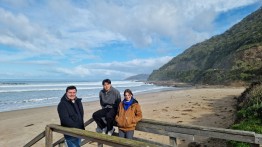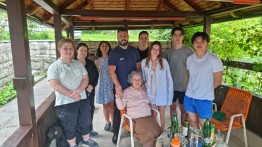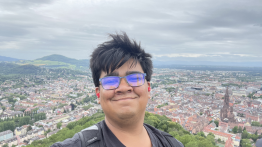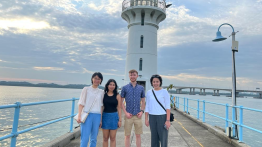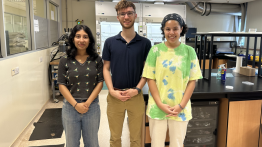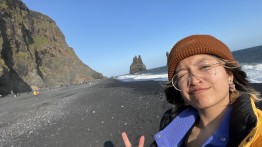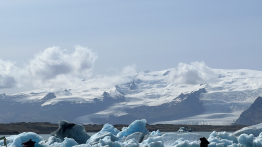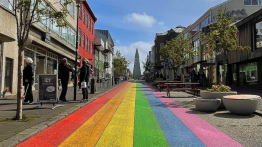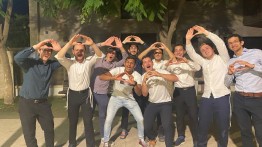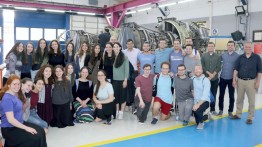2023 Summer Study Abroad
POSTED ON: September 28, 2023
Each summer, the Albert Nerken School of Engineering offers a 6–8-week study abroad experience to students in their second or third year at Cooper. Nine students participated in our summer study abroad programs in Australia, Bosnia, Germany, Guatemala, Iceland, Italy, and Singapore this summer. In addition, one of our students traveled to Israel and participated in the Summer Science Research Internship Program.
The Albert Nerken School of Engineering is grateful to the Victor and Eleanor DiFranco Endowed Fund and the E. Durbin & J. Morris Innovation Fund for underwriting the Dean’s Office Summer Abroad Cultural Immersion Fellowships.
AUSTRALIA & BOSNIA
Undergraduate engineering students Maya Grutman ME’24 and Lei (Raymond) Chi EE’25 participated in our inaugural study abroad research program at La Trobe University in Melbourne, Australia. This transformative experience was made possible through The Global Innovation Program, a visionary initiative led by the esteemed Dr. Eddie Custovic, Senior Lecturer and Academic at La Trobe University.
Over the course of 8 weeks, Maya and Raymond immersed themselves in a dynamic research environment alongside Dr. Custovic and fellow students from La Trobe University. Together, they tackled complex engineering challenges, pushing the boundaries of knowledge and innovation in their respective fields.
Their academic adventure extended beyond the borders of Australia when they embarked on a week-long journey to Sarajevo and Tuzla, Bosnia. There, they had the privilege of attending the 9th International Conference on "New Technologies, Development, and Application." This international exposure provided them with a unique perspective on global engineering trends and advancements.
Maya's research delved into the intricacies of the "Agfrost Crop Preservation Cooling System & ABB Robotics Project." For more in-depth insights into Maya's groundbreaking research, we invite you to explore her work further here.
"I had conversations with people from all different walks of life, I wandered and pondered. I shaped a deeper understanding of freedom, community, and identity. It was a time of opening myself up to the world in a way I hadn’t before. I came to understand how truly lucky and special it is to see the Earth in this way. My daily gratitude intensified: I thanked the stars, the moon, the water, the trees." – Maya Grutman ME’24
GERMANY
Two undergraduate engineering students studied abroad in Dresden and Karlsruhe, Germany.
Aymane Saissi ME’25 participated in the study abroad program at TECHNISCHE UNIVERSITAT in Dresden, Germany. The university is home to a large variety of research centers and institutes, covering virtually every academic discipline. Research at TU Dresden includes Health Sciences, Biomedicine, and Bioengineering; Information Technologies and Microelectronics; Smart Materials and Structures; Culture and Knowledge; and Energy and Environment.
“On the one hand, I'm lucky enough to have had an incredible cultural experience at Dresden. Indeed, the city is considered a jewel of Baroque beauty, it was almost entirely destroyed during the Second World War. The majority of the city's churches and historic structures are made of black and white granite. The black rocks are remnants of the original buildings, while the white rocks are from the reconstruction. It was a true masterpiece of both art and engineering to witness.” – Aymane Saissi ME’25
Pavan Kapoor ME’25 participated in the study abroad program at the Karlsruhe University of Applied Sciences in Karlsruhe, Germany.
“In Germany, I developed a rudimentary Virtual Reality program in Unity to interact with 3D models from a formula style racecar. Living alone in Germany was a unique challenge that made me more confident and pushed me outside of my comfort zone. I particularly enjoyed being able to travel easily to different countries and explore new cultures.” – Pavan Kapoor ME’25.
GUATEMALA
Electrical engineering junior, Arav Sharma, completed our 6-week study abroad experience at the Barbara Ford Peacebuilding Center in Guatemala. Dean Lisa Shay accompanied Arav on their first week in Guatemala, as she helped develop the summer study abroad experience in Guatemala in cooperation with Sister Virginia Searing, President of the Board of Directors of the Barbara Ford Peacebuilding Center Association, and two of the Center’s senior staff members, Marta Leticia Garcia Ajucum, Executive Director, and Luciano Laynez Perez, Director of Finances and Administration.
ICELAND
Undergraduate engineering students Irene (Won) Choi ME’24 and Lizelle Ocfemia ME’24 participated in our study abroad research program at Reykjavik University in Reykjavik, Iceland.
During their 6-weeks abroad, Irene and Lizelle actively engaged with the university's research unit within the Department of Engineering. Irene delved into an exploration of UX professionals' practices within the software industry, with a specific emphasis on user involvement in the design process. Meanwhile, Lizelle embarked on pioneering research aimed at developing a self-sufficient navigation framework for drones, utilizing a single camera to map and navigate their immediate surroundings.
“Personally, this experience marked significant growth. It improved my adaptability to new environments and honed my organizational skills. Living independently without family or roommates boosted my self-reliance, fostering confidence in my ability to handle unforeseen challenges and develop proactive problem-solving skills.” – Won Choi ME’24
"My trip to Iceland felt like a dream. It is a place where the day never ends, and the night rarely comes. It is a place where you can visit both volcanos and glaciers at a close distance. Constant 60-degree weather in the summertime! Imagine being served small cubes of fermented shark meat as a common appetizer. Iceland never failed to excite me! My favorite memory from my trip was the last week of my stay, where I was able to live amidst an impending volcanic eruption. That was the first time I had ever experienced a series of earthquakes with the largest magnitude being 5.2!" – Lizelle Ocfermia EE’25
ITALY
Senior civil Engineering Student, Frederick Choi, participated in our summer study abroad program at the Monteverdi Archaeological Field School in Grosseto, Italy.
The number of participants is limited to 10 in order to ensure an exceptional learning experience. The excavations are conducted in collaboration with the University at Buffalo – SUNY, the Department of Anthropology at Michigan State University, and the Associazione Archeologica Odysseus. The field school provides a comprehensive introduction to stratigraphic excavation methods and the study of excavated artifacts, covering topics such as excavation techniques, analysis of built structures and archaeological features, context analysis, finds handling and recording, as well as the examination of ceramic, glass, metal, bone, and numismatic materials.
The field school excavations focus on the remains of the Etruscan sanctuary and Republican village of Podere Cannicci, and on the deserted Medieval village of Castellaraccio di Monteverdi, along with the middle valley of the Ombrone river. These sites represent a unique occasion to investigate economies in transition and settlement patterns in the territory of Paganico.
SINGAPORE
Junior mechanical engineering student, Saira Billah, participated the Summer Engineering Research Internship for U.S. Students (SERIUS) program at the National University of Singapore (NUS). During her 8-weeks at the NUS College of Design and Engineering lab, Saira delved into cutting-edge research with an innovative twist.
Saira’s research focus centered around the utilization of SCOBY, a symbiotic culture of bacteria and yeast produced as a byproduct of the popular beverage, kombucha. Within the lab's dynamic environment, Saira undertook a multifaceted approach to harness SCOBY's potential for electronics. Her work encompassed the entire process, from mastering the art of kombucha production and SCOBY extraction, to refining the SCOBY material and preparing it for integration into electronics.
The overarching objective of Saira's research was to transform SCOBY into a versatile, leather-like material that could serve as a flexible substrate for electronic circuits. “I learned a lot about the process of conducting accurate and efficient research, as well as the problem-solving skills required to make developments in an entirely new field,” she shares.
“After completing my research for the day, I would often take the school buses to travel around Singapore. I got to see little India, Chinatown, visit many Hawker centers, and so much more. My favorite thing to do was try a different dish every time I went to a Hawker center so that I would get to try as much as possible. I had so much fun exploring Singapore and trying all the different foods, as well as building a relationship with my mentor.” – Saira Billah ME’25
ISRAEL
Junior electrical engineering student, Effie Bluestone, joined 28 undergraduate students from Harvard, Cornell, Princeton, Rutgers, Queens College, Touro College, Middlesex College, the State University of New York, and Yeshiva University, in the Summer Science Research Internship Program at Bar-Ilan University, in Tel Aviv, Israel.
The students worked with world-class scientists in the University's STEM research laboratories, from the departments of Engineering, Life Sciences, Mathematics, Chemistry, Physics, and Psychology, and the University’s Institute for Nanotechnology and Advanced Materials, and its Multidisciplinary Brain Research Center.
Effie worked on DNA genomic diagnostics. The problem that he worked on was that the computation for string comparison of DNA strands is very slow, and, as a consequence, the available software cannot efficiently handle its full computation. In order to expedite the process, Effie’s team introduced a hardware accelerator, with the goal of speeding up the overall process. Effie reported that he, “Worked with a team of outstanding professors and advisers backing me and guiding me through the process. I really enjoyed my research this summer and can hardly believe how much I learned and grew.”
He enjoyed the learning environment at Bar Ilan University, where the faculty and students come from dozens of different countries, and include a multitude of ethnicities, diverse cultures, gender identities, secular and religious beliefs, and dissimilar political affiliations. He reported that everyone worked harmoniously, consistent with the University’s theme of “Creating challenge-driven research centers that embrace practical research designed to change and improve the human experience.”
The Summer Science Research Internship Program operates independently of the Cooper Summer Study Abroad Program. Students who are interested should contact Bar-Ilan University directly.

